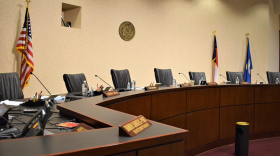Sports betting brought in $128 million in taxes the first year it was legal in North Carolina.
With that figure projected to grow, legislators are seeking to change who gets a cut, a move that will benefit state schools' athletics departments.
Both chambers' budgets would, for the first time, let the UNC system's biggest spenders on sports — the University of North Carolina at Chapel Hill and North Carolina State University — take a share of the proceeds.
House Speaker Destin Hall, R-Caldwell, told reporters that college sports are becoming increasingly professional operations, which require more money to stay relevant.
"It's not about winning ballgames. It's more about marketing for those schools, making sure they get those applicants," Hall said Thursday.
The House unveiled its budget Tuesday, and aims to keep the tax on sports wagering companies at 18%. But, the Senate has proposed doubling the tax rate to 36%.
Currently, all schools divide their share of the revenue evenly, getting about $1.2 million each last fiscal year.
The new formulas would give a larger share to Division I schools.
The House rewards schools whose football teams play in the FBS, or Football Bowl Subdivision, including Hall's alma mater Appalachian State University.
"Football is sort of the most expensive sport, and that's why we ranked it that way, but every school in the pot gets an increase in funds," Hall said.
He called FBS football teams "the greatest marketing tool that schools have" and the "front porch of a university."
Here's a rounded average of how much each school's athletic department would receive per year, if gambling spending grows as projected:
- UNC-Chapel Hill: $28 million in Senate budget. $13.2 million in House budget. Was $0.
- N.C. State: $28 million in Senate budget. $13.2 million in House budget. Was $0.
- Appalachian State: $5.8 million in Senate budget. $13.2 million in House budget. Was $1.2 million.
- East Carolina: $5.8 million in Senate budget. $13.2 million in House budget. Was $1.2 million.
- Elizabeth City State: $4.8 million in Senate budget. $3 million in House budget. Was $1.2 million.
- Fayetteville State: $4.8 million in Senate budget. $3 million in House budget. Was $1.2 million.
- North Carolina Agricultural & Technical: $5.3 million in Senate budget. $3.7 million in House budget. Was $1.2 million.
- North Carolina Central: $5.3 million in Senate budget. $3.7 million in House budget. Was $1.2 million.
- UNC-Asheville: $5.3 million in Senate budget. $3.7 million in House budget. Was $1.2 million.
- UNC-Charlotte: $5.8 million in Senate budget. $13.2 million in House budget. Was $1.2 million.
- UNC-Greensboro: $5.3 million in Senate budget. $3.7 million in House budget. Was $1.2 million.
- UNC-Pembroke: $4.8 million in Senate budget. $3 million in House budget. Was $1.2 million.
- UNC-Wilmington: $5.3 million in Senate budget. $3.7 million in House budget. Was $1.2 million.
- Western Carolina: $5.3 million in Senate budget. $3.7 million in House budget. Was $1.2 million.
- Winston-Salem State: $4.8 million in Senate budget. $3 million in House budget. Was $1.2 million.
Both the House and Senate would shift millions away from the fund that attracts major events, games and attractions to the state.
The House also significantly drops the proportion flowing into the general fund.







